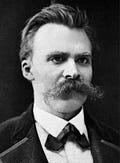There’s no such thing as a happy nihilist
Periodically I read about nihilism being a happy philosophy of life. Here’s why it ain’t.
Nihilism is the notion that nothing matters in life because there is no cosmic meaning to be found. The latter statement is a good corrective for the billions of people who insist that such meaning is available, usually provided by the existence of a God that they worship—a most undignified action for any human being, in my opinion. But as soon as we try to move from the salutary destructive effect of nihilism to any kind of positive, let alone “happy,” version of it, philosophical and existential troubles ensue.
And yet, Melbourne-based journalist Wendy Syfret, author The Sunny Nihilist: How a Meaningless Life Can Make You Truly Happy, insists that nihilism is a positive philosophy of life, for example in an essay published in Psyche. Let’s take a look.
Syfret’s starting point is one that I share: nowadays we are constantly pushed to find meaning in everything we do, which has led to the creation of a large market for books, podcasts, and TED talks that claim to provide you with reliable shortcuts to a happy life. It is, as she says, exhausting:
“Increasingly, aspirations are higher. A chocolate bar isn’t skim milk powder and sugar, it’s a chance to create an intergenerational family moment. A lipstick isn’t a bullet of color to light up a drawn face, but a weapon of radical self-expression.”
She claims that this obsessive quest for meaning is the cause for the commonality of modern existential malaise. But that, arguably, gets things exactly wrong. I should think that things are rather the other way around: the growing industry founded on the quest for meaning is a response to, not a cause of, the dissatisfaction that many feel about contemporary life.
Whatever the question, the real answer, Syfret tells us, lies in embracing pointless, nihilistic chaos. According to the author, nihilism is rooted in the realization that every conceivable source of purpose—including religion, politics, family, all the way to the very notion of truth itself—are arbitrary human constructs. As her favorite nihilist, Nietzsche, summarized it: “Every belief, every considering something true, is necessarily false because there is simply no true world.”
Wrong. Some of the potential sources of meaning listed by Syfret are, in fact, arbitrary human creations not founded on anything true, like religions. But a number of human constructs—like families and societies—are not arbitrary at all. They result from facts about human nature, and specifically about the fact that, as the Stoics put it, we are rational and social animals.
Besides, the childish notion that “there is simply no true world” is obviously incoherent: is what Nietzsche says about truth and the world itself true? If so, than his statement is false; if not, why should we believe him over the street preacher around the corner?
Syfret mentions American philosopher Donald Crosby’s classification of types of nihilism: moral, epistemological, cosmic, and existential. According to moral nihilism there are no moral truths; epistemological nihilism claims that there are no truths at all, of any kind; cosmic nihilism says that Nature is fundamentally “indifferent and hostile”; and existential nihilism is the notion that since there is no meaning in life then everything is pointless.
Let us pause for a moment and unpack this breathless and—I argue—deeply flawed sequence. First, are there moral truths? I’ve argued in this newsletter that the answer is a qualified yes. I do agree that ethics is a human construction, because it concerns itself with solutions to a human problem: how shall we live with other human beings? But the answers provided by moral reasoning are not arbitrary, as they are constrained by facts about the nature of the species Homo sapiens. So, for instance, the answer to the question of whether murder is “wrong” is most definitely yes, because a human society were people were allowed to kill others randomly, for pleasure, or for profit, couldn’t exist for long. Moral truths, then, take the form of conditional imperatives: IF you are a human being and IF you wish to live and prosper, THEN thou shall not murder.
Second, how is anyone going to seriously argue that there are no truths of any kind (epistemic nihilism)? Is the square root of nine not three? Is the fact that the planet Uranus has rings not a fact? I could go on for a long, long time with similar examples. Of course in many cases we can only approximate truths, and we should always be open to the possibility that we are wrong, but c’mon let’s be serious for a moment.

Third, Nature cannot coherently be both indifferent and hostile (cosmic nihilism). It’s either one or the other, those are mutually exclusive categories. It seems to me obvious that Nature is indifferent to us, meaning that there is nobody out there who cares one way or another about our welfare. Hostility, by contrast, implies a malevolent presence, of which I see no evidence. But yes, there is no cosmic meaning. Here, though, nihilism thrives on the basis of an ambiguity in the use of the word “meaning.” Just because there is no cosmic meaning imposed on us from above it doesn’t mean there are no local meanings that human beings derive from their own choices and pursuits. I’ll come back to this below.
Fourth, it should by now be clear that “since there is no meaning in life then anything is pointless” is again rooted in an ambiguous use of “meaning.” Is Syfret saying that there is no cosmic meaning? If so, she’s correct. Is she saying that there is no meaning at any level? If so, she’s wrong. Therefore her conclusion, that everything is pointless, simply does not logically follow unless she resolves the linguistic ambiguity that she has set up.
I could end this essay here, to be frank. But Syfret is not done yet, going on to argue that it is perfectly possible to be a sunny nihilist, whereby she runs into additional inconsistencies and contradictions. Let me explain.
If nothing matters long-term, as Syfret puts it, then her attention shifts to the here and now. But why? According to nihilism nothing at all matters, either long or short term. So focusing on now is just as meaningless as focusing on the big picture. The Stoics also practice what they call “the view from above,” reminding themselves that their struggles are inconsequential at the cosmic level. But they draw the opposite conclusion from Syfret’s: what I do here and now matters because it affects myself and my loved ones, but I should regard what happens to me with equanimity precisely because the effects are limited.
Syfret then praises at length the main character of the movie The Beach Bum (2019), played by Matthew McConaughey. The character in question is a cartoon hedonist. “His is a woozy and colorful tale of excess and hedonism that involves a lot of drinking, drugs, avoided responsibility, and sex. All of which are indulged in with few consequences.” Wonderful. And this is supposed to be a nihilist’s role model? Besides, why on earth would a nihilist care about pleasure anyway? Isn’t pleasure just as meaningless as everything else? No, on this one I’m with Camus: the only meaningful question (for a nihilist) is why not commit suicide. And there is no meaningful answer, pace Sisyphus.

We are reassured by Syfret that being motivated by instant pleasure doesn’t mean we are going to become selfish assholes. Why not? Because as Nietzsche put it in Beyond Good and Evil:
“He who fights with monsters might take care lest he thereby become a monster. And if you gaze for long into an abyss, the abyss gazes also into you.”
Right, but, once more, why should a nihilist “take care” of not becoming a monster? Syfret claims that the void in which we stare is to be filled by whatever we want. Indeed, but we get no guidance or reason for why I should want to fill the void by caring for others as opposed to by cultivating the inclinations of a psychopath.
After that Syfret descends into complete incoherence. We are supposed to be wondering about what we want to last after we are gone, what we wish to protect and treasure. We are told that we can find relief in (unspecified) larger causes. At the cost of beginning to sound like a broken record: why? If everything is meaningless…
A bit later on we are encouraged to engage in a meditation on death, and we are given Epicurus’s argument for not being afraid of dying:
“Death does not concern us, because as long as we exist, death is not here. And when it does come, we no longer exist.”
But the Epicureans were not nihilists! The Stoics too meditated on death, but they did it in order to remind themselves of the preciousness of being alive here and now. That sense of preciousness is simply not available to the convinced nihilist (of which, I wager, there are actually none).
Life is meaningful because we give it meaning. No need to invoke cosmic considerations or non-existent gods. The meaning we find in our existence is certainly human, but it isn’t arbitrary. Because we are social, we find meaning in relationships with other people, whether our partner, our children, or our friends. Because we are capable of reason we find meaning in a number of pursuits that exercise that reason, often for the broader benefit of the human cosmopolis. We write, we read, we make art and music, we explore, we build.
Nihilism in a sense makes the opposite mistake as religions do. For the latter meaning can only come from a higher power. For the former there simply is no meaning. As is often the case, the truth (ah!) is in the middle: meaning is local and constructed, but not whimsical. And it is more than enough to fill our lives and make them precious.




“You would not enjoy Nietzsche, sir. He is fundamentally unsound.”
-- Jeeves
“Carry On, Jeeves”, P.G. Wodehouse
Thanks for this post I couldn’t agree more with your arguments ! I have a question ... some philosophers argue like Parfit that if there aren’t objective normative reasons for action (and thus meaning ) then nothing matters. I hold a subjectivist view point , that reasons for action aren’t objective but provided by human nature like you argue . However Parfit argues that using our human desires ( that aren’t objective ) as a guide to action are wholly contingent and therefore arbitrary . Therefore nothing matters . I have seen this argument a few times ( that our subjective reasons if they are contingent are arbitrary ) . What would you say to this ? Thank you!